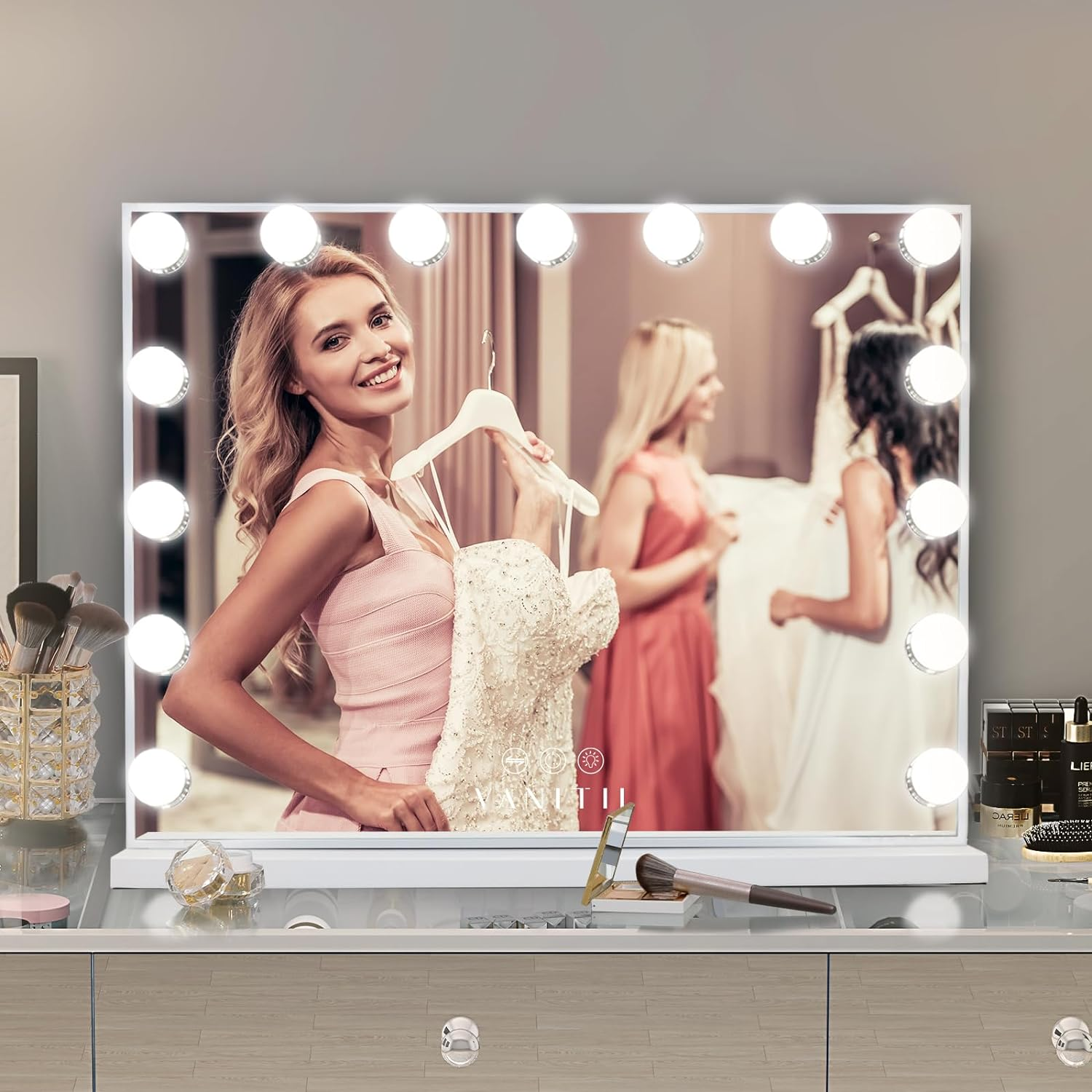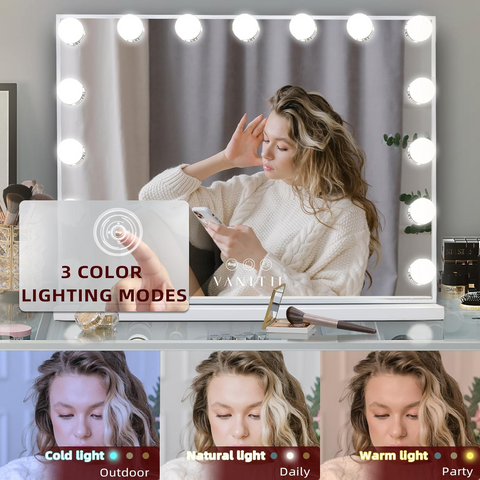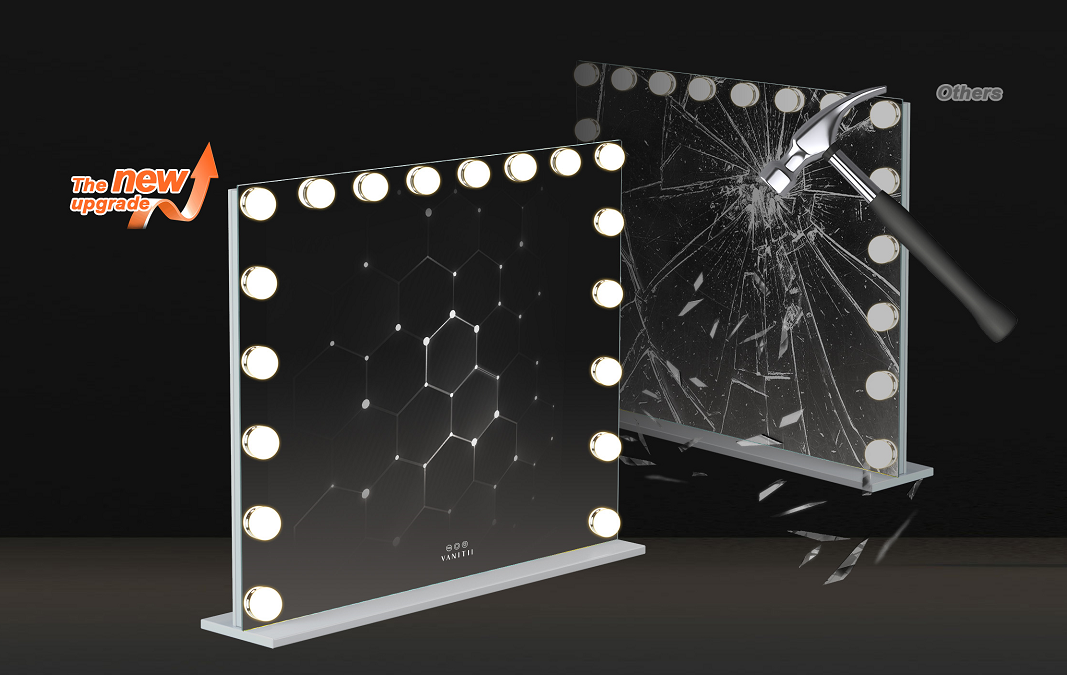Many people now use lighted makeup mirrors with LED lights. They save energy and let you control how bright they are. But some worry that being too close to the very bright LEDs for a long time could possibly hurt your eyes. This article looks into that concern. We'll learn about how the mirrors work if they damage eyesight over time, and tips to use them safely.
Understanding LED Lighting
LED, or light-emitting diode lighting, works differently than traditional incandescent bulbs. It uses semiconductors to create light more efficiently, rather than heating a filament wire.
LED lights also emit light differently. Traditional bulbs radiate light and heat in all directions. But LEDs target the direction of light beams more precisely. This makes them ideal for application in makeup mirrors, concentrating illumination exactly where it's needed.
LED lighting relies primarily on blue light waves on the visible color spectrum to create bright white light. Blue light scatters more easily than warmer long-wavelength lights. This boosts energy efficiency compared to heat-intensive yellow ambient lighting.
But with questions over blue light penetration, what does this mean for eyes? While human eyes perceive blue light well, excessive or extended exposures can impact sleep cycles and potentially retinal cells over time.
So, LED delivers huge efficiency and lighting precision benefits. But the blue-rich light composition prompting those gains may contribute to health concerns with close-range beauty mirror exposure.
Types of LED Makeup Mirror Lights
The LED bulbs illuminating makeup mirrors are typically categorized into three main varieties:

1. Cool White Lighting
These bright, blue-hued LEDs simulate natural daylight for the most true-to-life color accuracy. The crisp illumination shows makeup shades precisely as they will appear in sunlit conditions. Cool white performs as ideal for choosing the correct foundation matches.
2. Warm White Lighting
Featuring softer yellow tones, warm white LEDs give off a gently flattering ambiance akin to indoor lighting. Balancing cool and warm white bulbs together establishes balanced, versatile mirror lighting.
3. Daylight Lighting
Tailored to mimic sunny skies, full-spectrum daylight bulbs provide complete visibility across colors. Such true-to-natural light prevents makeup mishaps between applications and the outside world.
Alongside LED color types, many mirrors also incorporate adjustable controls over brightness levels and color temperature. Users can customize between crisp cool beams or diffuse warm glows at low to high intensities perfect for detailed makeup needs.
Why LED Mirrors are Great
Tired of struggling to get your eyeliner just right or fixing makeup mistakes once you step outside? It's time to upgrade to an LED-lighted mirror for makeup magic! Here's why they beat old bulbs:
1. Spend Less, Not More
The super energy-efficient LED lights use a fraction of the electricity traditional bulbs do - we're talking slashing your power bill big time. Plus LEDs last many years longer, so no replacing burned-out bulbs constantly. Saving cash and headaches? Now that's smart.
2. Light That Shows All
The bright, white beam from LEDs finally shows every inch of skin in full detail. Apply flawless foundation seeing each pore for smooth evenness. Get eye and lip color completely symmetrical. And catch eyebrow hairs out of place or lipstick smears easily. That clear, hospital-bright lighting cures makeup blindness for good!
3. Match the Mood Lighting
Tired of makeup shade failing to step outside? Many LED mirrors allow adjusting settings. Use cooler blue tones matching daylight when applying foundation or eye shadow. Check warm yellow restaurant lighting won't lead to a scary clown face. Even dim to super-bright beams to match life's locations. Talk about versatility!
4. Flawless Face, Happy Wallet
Between the lower electric bills, long-term savings from bulbs that seem to last forever, and delivering precision application our eyes need day-to-night? LED mirrors earned their status as must-have makeup holy grails! Ditch the frustrations and embrace effortless beauty routines now.
Are LED Makeup Mirrors Bad for Your Eyes?
The simple answer is no - LED makeup mirrors are not inherently harmful to eyes when used reasonably and safely. Scientific data so far does not show definitive negative impacts on vision or eye health with typical mirror usage of 30 minutes daily or less at over 18 inches away.
However, some uncertainty still exists on whether cumulative long-term exposure over many years could potentially cause changes. The lack of multi-decade studies tracking LED mirror users leaves the question open. But following common-sense guidelines minimizes any risks:
If users exceed distances and daily duration recommendations over decades, some potential but inconclusive risks include:
- Disrupting sleep cycles and focus due to blue light suppression of melatonin production
- Accelerating normal vision decline that happens with aging
- Possible retina cell damage from high energy blue light waves over extremely extended close-range exposure
However, utilizing adjustable brightness settings, taking breaks, limiting use to 30 minutes per day, and getting comprehensive eye exams safeguards vision and handles the rare worst-case risks. So, taking simple precautions allows continuing to leverage LED mirrors safely.
LED Mirrors vs. Phones and Tablets

Many worry that LED mirrors are worse for the eyes than the phones or iPads we use daily. But light brightness and exposure duration differ more than people may think.
1. Brightness
Tablets and phones shine light directly into the eyes from less than 12 inches away. Mirrors reflect indirectly off the face from over 18 inches away. So mirror light reaches eyes at lower intensity.
2. Daily Duration
Most people use phones/tablets for 5 or more hours cumulatively per day. But typical mirror makeup sessions range from 10-30 minutes total daily.
And remember - mirrors only reflect whatever existing light they're exposed to, unlike self-powered screens. This makes phones and tablets use much higher amounts of overall eye exposure.
While uncertainty remains about impacts decades later, LED mirrors likely pose less risk to eyes than existing mobile devices based on brightness, duration, and proximity.
How to Use LED Mirrors Safely
Can't live without the perfect makeup lighting of an LED mirror, but still have some concerns? Just follow basic safety tips while using them:
- Distance- Stay 18 inches back from the mirror to avoid the closest proximity. Farther is even better.
- Minimize Time- Try to keep daily use under 30 minutes max if possible.
- Buy Adjustable Lights- Get dimmable LEDs allowing you to lower brightness as needed to cut exposure.
- See If Flicker-Free- Some mirrors use safer constant lights verified not to disrupt vision. Choose these options first.
- Remember to Take Breaks- Give your eyes a break by looking away every few minutes according to the 20-20-20 rule.
- Get Yearly Eye Exams - Catch any changes early by monitoring vision and eye health annually.
Combining smart device habits with sensible purchases and settings can allow enjoying LED mirrors safely!
Lighting the Way to Safe and Sustainable Beauty Routines
LED makeup mirrors serve up valuable magic lighting benefits. But the efficient LED blue-rich lights sparked health worries. In fact, typical user exposure stays low enough risk. Still, the decades-long impact remains unsure. So, stay beyond 18 inches, use less than 30 minutes daily, give eyes screen breaks, choose adjustable settings, and get yearly exams. Eye teams endorse smart lighting enjoyment within reason. When used wisely, LEDs can safely light up beauty routines in the long run.




Leave a comment
This site is protected by hCaptcha and the hCaptcha Privacy Policy and Terms of Service apply.